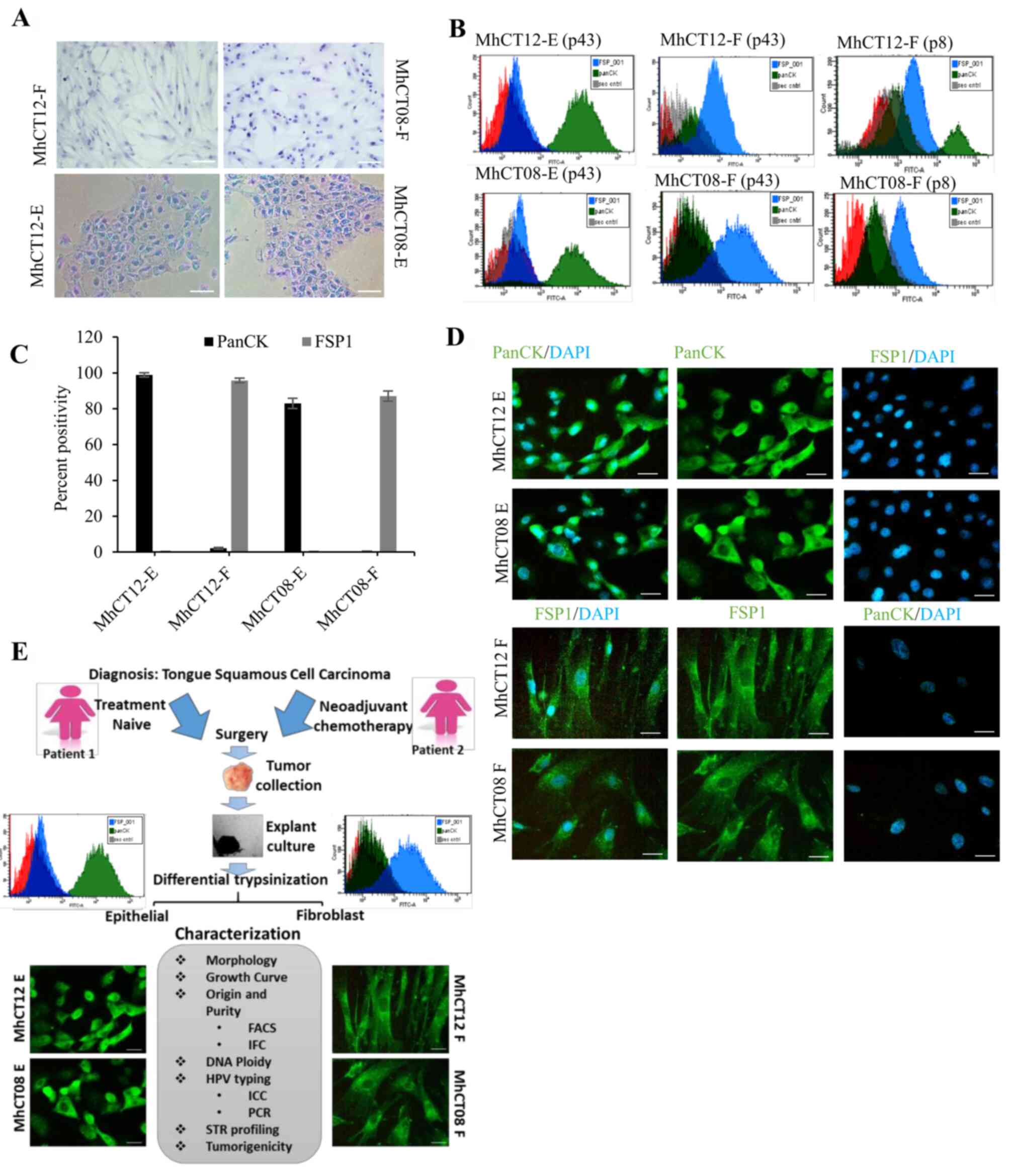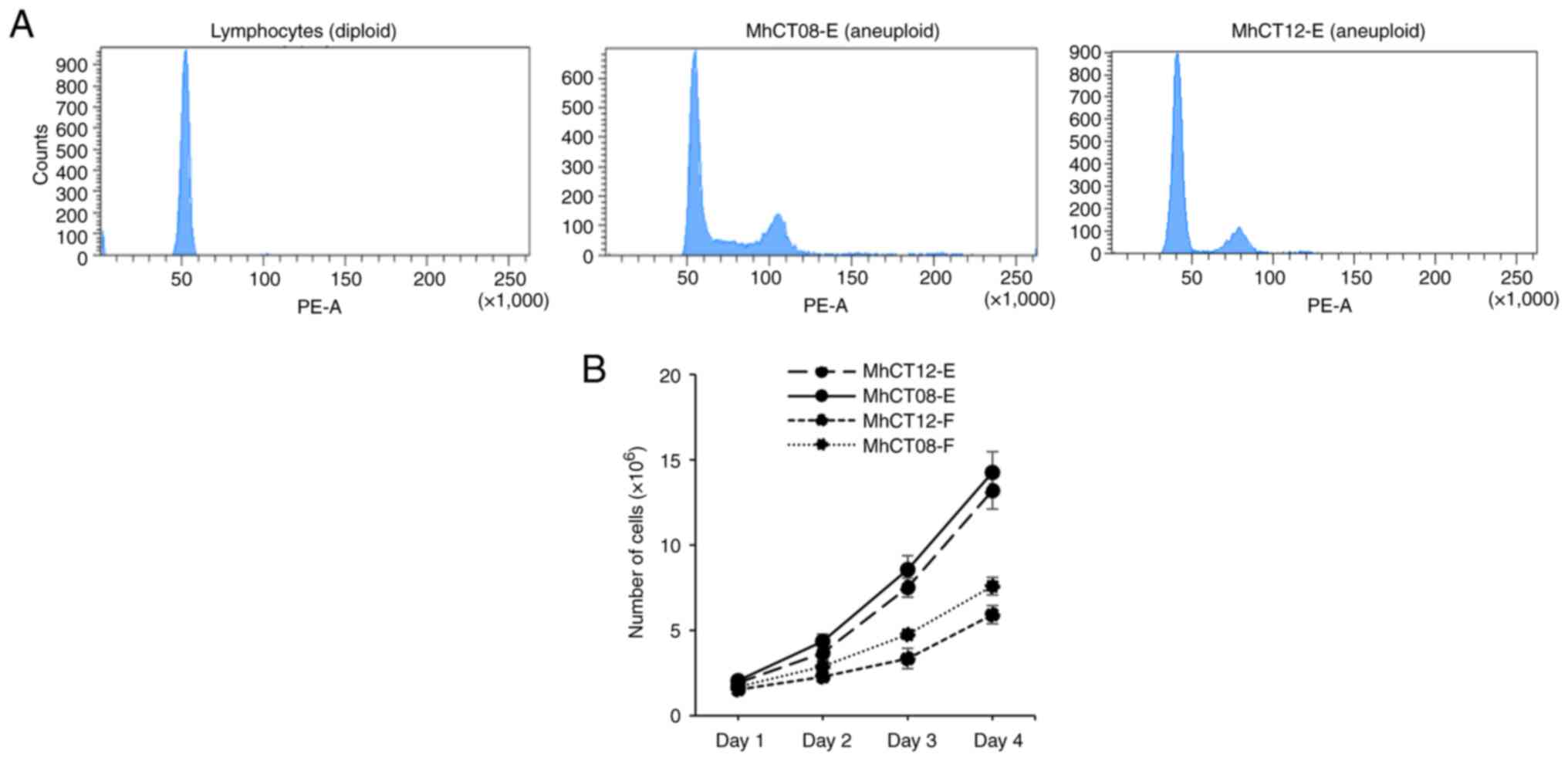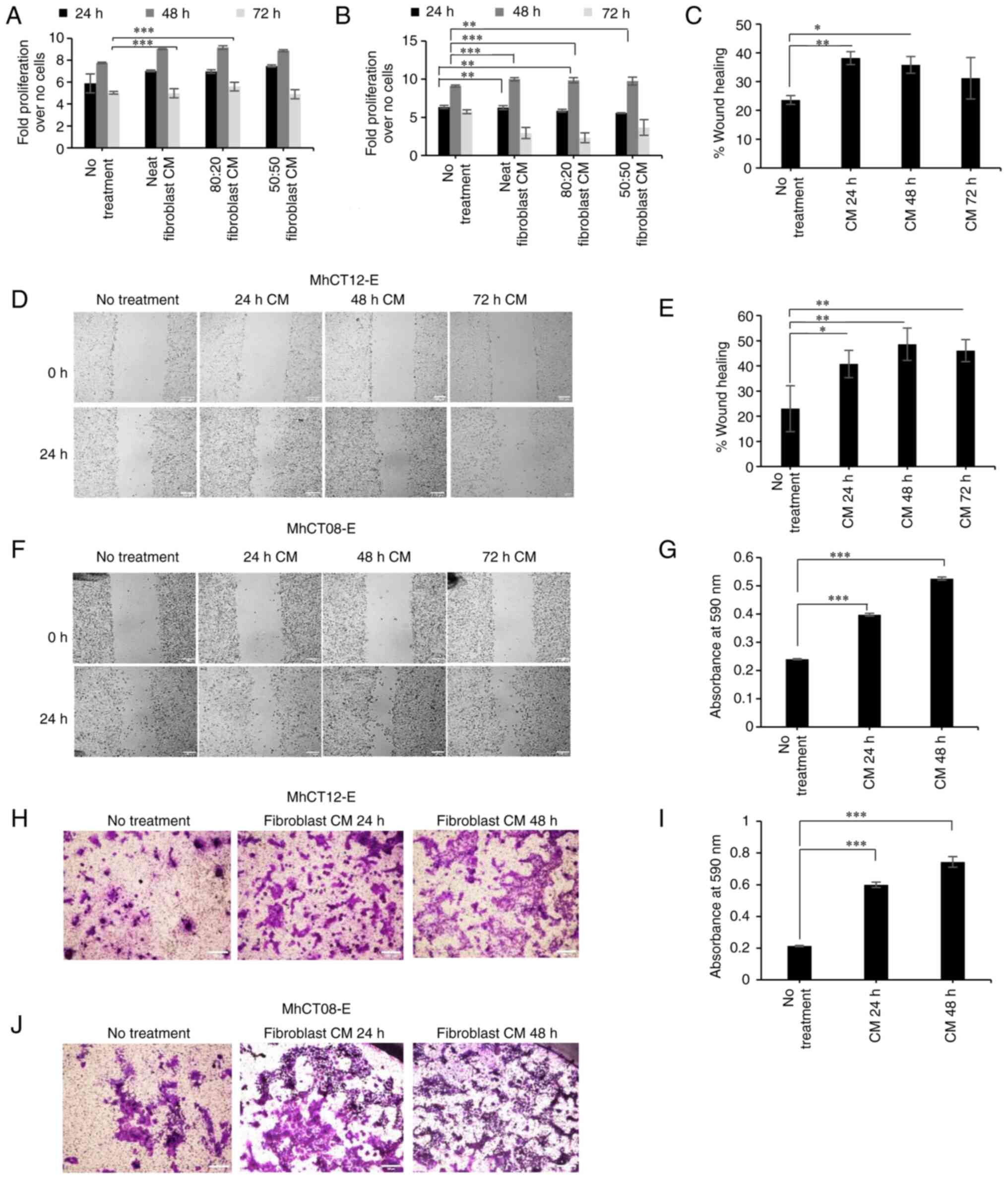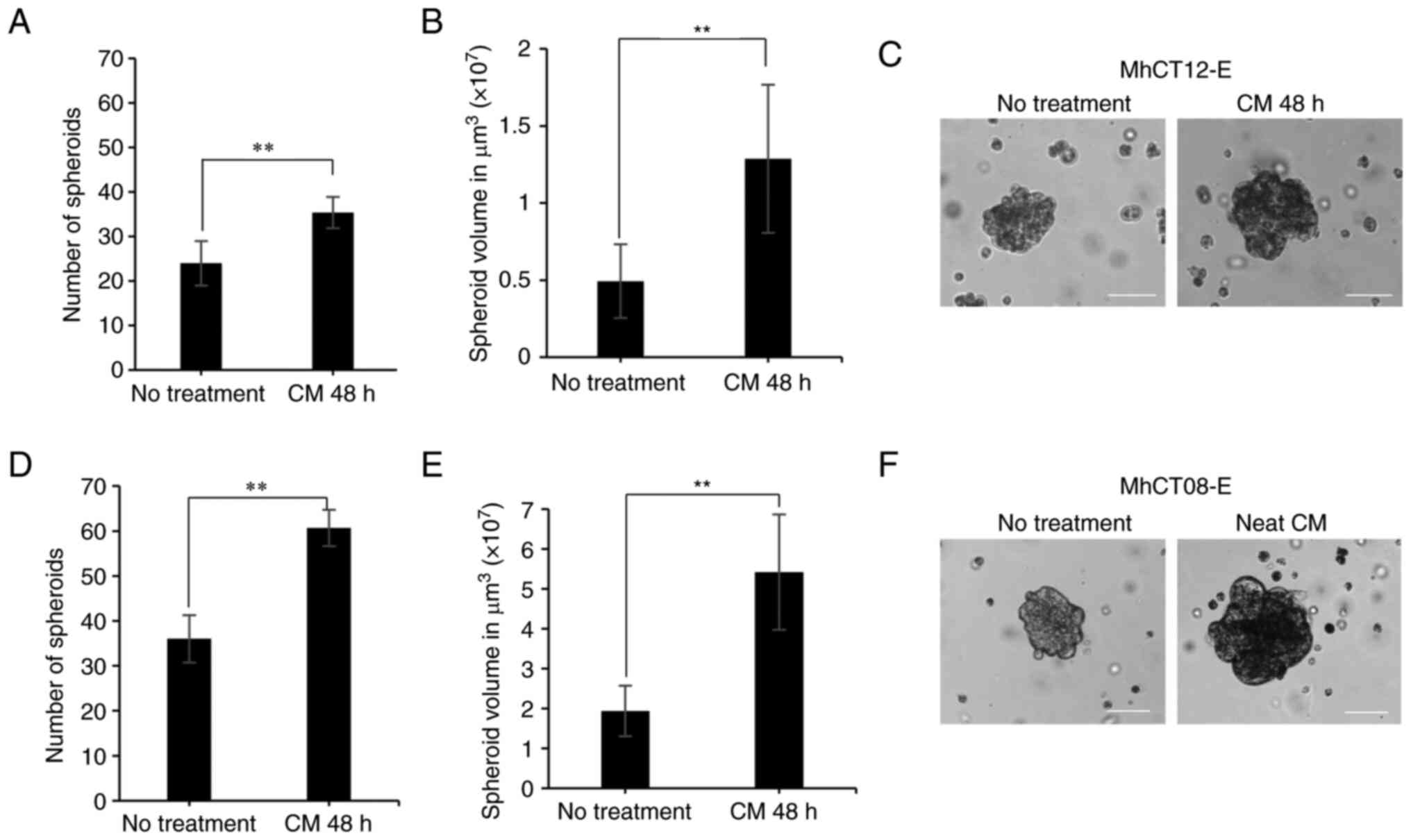|
1
|
Sung H, Ferlay J, Siegel RL, Laversanne M,
Soerjomataram I, Jemal A and Bray F: Global cancer statistics 2020:
GLOBOCAN estimates of incidence and mortality worldwide for 36
cancers in 185 countries. CA Cancer J Clin. 71:209–249. 2021.
View Article : Google Scholar : PubMed/NCBI
|
|
2
|
National Cancer Institute, . SEER Cancer
Stat Facts: Tongue Cancer. National Cancer Institute; Bethesda, MD:
2017, 2019, https://seer.cancer.gov/statfacts/html/tongue.htmlJune
7–2022
|
|
3
|
Gelband H, Jha P, Sankaranarayanan R and
Horton S: Disease control priorities, third edition (volume 3):
Cancer. The World Bank; 2015, View Article : Google Scholar
|
|
4
|
Jamal A, Homa DM, O'Connor E, Babb SD,
Caraballo RS, Singh T, Hu SS and King BA: Current cigarette smoking
among adults-United States, 2005-2014. MMWR Morb Mortal Wkly Rep.
64:1233–1240. 2015. View Article : Google Scholar : PubMed/NCBI
|
|
5
|
Patel SC, Carpenter WR, Tyree S, Couch ME,
Weissler M, Hackman T, Hayes DN, Shores C and Chera BS: Increasing
incidence of oral tongue squamous cell carcinoma in young white
women, age 18 to 44 years. J Clin Oncol. 29:1488–1494. 2011.
View Article : Google Scholar : PubMed/NCBI
|
|
6
|
Durr ML, Van Zante A, Li D, Kezirian EJ
and Wang SJ: Oral tongue squamous cell carcinoma in never-smokers:
Analysis of clinicopathologic characteristics and survival.
Otolaryngol Head Neck Surg. 149:89–96. 2013. View Article : Google Scholar : PubMed/NCBI
|
|
7
|
Durr ML, Li D and Wang SJ: Oral cavity
squamous cell carcinoma in never smokers: Analysis of
clinicopathologic characteristics and survival. Am J Otolaryngol.
34:388–393. 2013. View Article : Google Scholar : PubMed/NCBI
|
|
8
|
Heaton CM, Durr ML, Tetsu O, Van Zante A
and Wang SJ: TP53 and CDKN2a mutations in never-smoker oral tongue
squamous cell carcinoma. Laryngoscope. 124:E267–E273. 2014.
View Article : Google Scholar : PubMed/NCBI
|
|
9
|
Ernster JA, Sciotto CG, O'Brien MM, Finch
JL, Robinson LJ, Willson T and Mathews M: Rising incidence of
oropharyngeal cancer and the role of oncogenic human papilloma
virus. Laryngoscope. 117:2115–2128. 2007. View Article : Google Scholar : PubMed/NCBI
|
|
10
|
Chaturvedi AK, Engels EA, Pfeiffer RM,
Hernandez BY, Xiao W, Kim E, Jiang B, Goodman MT, Sibug-Saber M,
Cozen W, et al: Human papillomavirus and rising oropharyngeal
cancer incidence in the United States. J Clin Oncol. 29:4294–4301.
2011. View Article : Google Scholar : PubMed/NCBI
|
|
11
|
Ramqvist T, Grün N and Dalianis T: Human
papillomavirus and tonsillar and base of tongue cancer. Viruses.
7:1332–1343. 2015. View
Article : Google Scholar : PubMed/NCBI
|
|
12
|
Miserocchi G, Mercatali L, Liverani C, De
Vita A, Spadazzi C, Pieri F, Bongiovanni A, Recine F, Amadori D and
Ibrahim T: Management and potentialities of primary cancer cultures
in preclinical and translational studies. J Transl Med. 15:2292017.
View Article : Google Scholar : PubMed/NCBI
|
|
13
|
Fu S, Dong L, Sun W, Xu Y, Gao L and Miao
Y: Stromal-epithelial crosstalk provides a suitable
microenvironment for the progression of ovarian cancer cells in
vitro. Cancer Invest. 31:616–624. 2013. View Article : Google Scholar : PubMed/NCBI
|
|
14
|
National Cancer Institute, . Molecular
Crosstalk Promotes Tumor Growth. https://www.cancer.https://www.cancer.gov/news-events/cancer-currents-blog/2016/crosstalk-pancreaticJune
7–2022
|
|
15
|
Bremnes RM, Dønnem T, Al-Saad S, Al-Shibli
K, Andersen S, Sirera R, Camps C, Marinez I and Busund LT: The role
of tumor stroma in cancer progression and prognosis: Emphasis on
carcinoma-associated fibroblasts and non-small cell lung cancer. J
Thorac Oncol. 6:209–217. 2011. View Article : Google Scholar : PubMed/NCBI
|
|
16
|
Ni Y, Zhou X, Yang J, Shi H, Li H, Zhao X
and Ma X: The role of tumor-stroma interactions in drug resistance
within tumor microenvironment. Front Cell Dev Biol. 9:6376752021.
View Article : Google Scholar : PubMed/NCBI
|
|
17
|
Bussard KM, Mutkus L, Stumpf K,
Gomez-Manzano C and Marini FC: Tumor-associated stromal cells as
key contributors to the tumor microenvironment. Breast Cancer Res.
18:842016. View Article : Google Scholar : PubMed/NCBI
|
|
18
|
Gawas NP, Navarange SS, Chovatiya GL,
Chaturvedi P and Waghmare SK: Establishment and characterization of
novel human oral squamous cell carcinoma cell lines from
advanced-stage tumors of buccal mucosa. Oncol Rep. 41:2289–2298.
2019.PubMed/NCBI
|
|
19
|
Pansare K, Gardi N, Kamat S, Dange P,
Previn R, Gera P, Kowtal P, Amin K and Sarin R: Establishment and
genomic characterization of gingivobuccal carcinoma cell lines with
smokeless tobacco associated genetic alterations and oncogenic
PIK3CA mutation. Sci Rep. 9:82722019. View Article : Google Scholar : PubMed/NCBI
|
|
20
|
Hamid S, Lim KP, Zain RB, Ismail SM, Lau
SH, Mustafa WM, Abraham MT, Nam NA, Teo SH and Cheong SC:
Establishment and characterization of Asian oral cancer cell lines
as in vitro models to study a disease prevalent in Asia. Int
J Mol Med. 19:453–460. 2007.PubMed/NCBI
|
|
21
|
Svobodova M, Raudenska M, Gumulec J,
Balvan J, Fojtu M, Kratochvilova M, Polanska H, Horakova Z,
Kostrica R, Babula P, et al: Establishment of oral squamous cell
carcinoma cell line and magnetic bead-based isolation and
characterization of its CD90/CD44 subpopulations. Oncotarget.
8:66254–66269. 2017. View Article : Google Scholar : PubMed/NCBI
|
|
22
|
Kaur J and Ralhan R: Establishment and
characterization of a cell line from smokeless tobacco associated
oral squamous cell carcinoma. Oral Oncol. 39:806–820. 2003.
View Article : Google Scholar : PubMed/NCBI
|
|
23
|
Patil TT, Kowtal PK, Nikam A, Barkume MS,
Patil A, Kane SV, Juvekar AS, Mahimkar MB and Kayal LL:
Establishment of a tongue squamous cell carcinoma cell line from
indian gutka chewer. J Oral Oncol. 2014:2860132014.
|
|
24
|
Tatake RJ, Rajaram N, Damle RN, Balsara B,
Bhisey AN and Gangal SG: Establishment and characterization of four
new squamous cell carcinoma cell lines derived from oral tumors. J
Cancer Res Clin Oncol. 116:179–186. 1990. View Article : Google Scholar : PubMed/NCBI
|
|
25
|
García-Inclán C, López-Hernández A,
Alonso-Guervós M, Allonca E, Potes S, Melón S, López F, Llorente JL
and Hermsen M: Establishment and genetic characterization of six
unique tumor cell lines as preclinical models for sinonasal
squamous cell carcinoma. Sci Rep. 4:49252014. View Article : Google Scholar : PubMed/NCBI
|
|
26
|
Mulherkar R, Goud AP, Wagle AS, Naresh KN,
Mahimkar MB, Thomas SM, Pradhan SA and Deo MG: Establishment of a
human squamous cell carcinoma cell line of the upper aero-digestive
tract. Cancer Lett. 118:115–121. 1997. View Article : Google Scholar : PubMed/NCBI
|
|
27
|
Zhao M, Sano D, Pickering CR, Jasser SA,
Henderson YC, Clayman GL, Sturgis EM, Ow TJ, Lotan R, Carey TE, et
al: Assembly and initial characterization of a panel of 85
genomically validated cell lines from diverse head and neck tumor
sites. Clin Cancer Res. 17:7248–7264. 2011. View Article : Google Scholar : PubMed/NCBI
|
|
28
|
Hayes TF, Benaich N, Goldie SJ, Sipilä K,
Ames-Draycott A, Cai W, Yin G and Watt FM: Integrative genomic and
functional analysis of human oral squamous cell carcinoma cell
lines reveals synergistic effects of FAT1 and CASP8 inactivation.
Cancer Lett. 383:106–114. 2016. View Article : Google Scholar : PubMed/NCBI
|
|
29
|
Lin CJ, Grandis JR, Carey TE, Gollin SM,
Whiteside TL, Koch WM, Ferris RL and Lai SY: Head and neck squamous
cell carcinoma cell lines: Established models and rationale for
selection. Head Neck. 29:163–188. 2007. View Article : Google Scholar : PubMed/NCBI
|
|
30
|
Easty DM, Easty GC, Carter RL, Monaghan P
and Butler LJ: Ten human carcinoma cell lines derived from squamous
carcinomas of the head and neck. Br J Cancer. 43:772–785. 1981.
View Article : Google Scholar : PubMed/NCBI
|
|
31
|
Wang SJ, Asthana S, van Zante A, Heaton
CM, Phuchareon J, Stein L, Higuchi S, Kishimoto T, Chiu CY, Olshen
AB, et al: Establishment and characterization of an oral tongue
squamous cell carcinoma cell line from a never-smoking patient.
Oral Oncol. 69:1–10. 2017. View Article : Google Scholar : PubMed/NCBI
|
|
32
|
Dwivedi N, Mondal S, P K S, T S, Sachdeva
K, Bathula C, K V, K S N, Damodar S, Dhar SK and Das M: Relative
quantification of BCL2 mRNA for diagnostic usage needs stable
uncontrolled genes as reference. PLoS One. 15:e02363382020.
View Article : Google Scholar : PubMed/NCBI
|
|
33
|
Chiu PL, Chang CH, Lin YL, Tsou PH and Li
BR: Rapid and safe isolation of human peripheral blood B and T
lymphocytes through spiral microfluidic channels. Sci Rep.
9:81452019. View Article : Google Scholar : PubMed/NCBI
|
|
34
|
Asiaf A, Ahmad ST, Zargar MA, Mufti SM and
Mir SH: Prevalence of human papillomavirus infection in a Kashmiri
ethnic female population. Genet Test Mol Biomarkers. 16:904–909.
2012. View Article : Google Scholar : PubMed/NCBI
|
|
35
|
Arya AD, Hallur PM, Karkisaval AG,
Gudipati A, Rajendiran S, Dhavale V, Ramachandran B, Jayaprakash A,
Gundiah N and Chaubey A: Gelatin methacrylate hydrogels as
biomimetic three-dimensional matrixes for modeling breast cancer
invasion and chemoresponse in vitro. ACS Appl Mater Interfaces.
8:22005–22017. 2016. View Article : Google Scholar : PubMed/NCBI
|
|
36
|
Van der Scheuren B, Cassiman JJ and Van
den Berghe H: Morphological characteristics of epithelial and
fibroblastic cells growing out from biopsies of human skin. J
Invest Dermatol. 74:29–35. 1980. View Article : Google Scholar : PubMed/NCBI
|
|
37
|
Cell Morphology|Thermo Fisher
Scientific-IN, . https://www.thermofisher.com/in/en/home/references/gibco-cell-culture-basics/cell-morphology.html
|
|
38
|
Park CK, Jung WH and Koo JS: Expression of
cancer-associated fibroblast-related proteins differs between
invasive lobular carcinoma and invasive ductal carcinoma. Breast
Cancer Res Treat. 159:55–69. 2016. View Article : Google Scholar : PubMed/NCBI
|
|
39
|
Sahai E, Astsaturov I, Cukierman E,
DeNardo DG, Egeblad M, Evans RM, Fearon D, Greten FR, Hingorani SR,
Hunter T, et al: A framework for advancing our understanding of
cancer-associated fibroblasts. Nat Rev Cancer. 20:174–186. 2020.
View Article : Google Scholar : PubMed/NCBI
|
|
40
|
Vaidya MM, Borges AM, Pradhan SA and
Bhisey AN: Cytokeratin expression in squamous cell carcinomas of
the tongue and alveolar mucosa. Eur J Cancer Part B Oral Oncol.
32B:333–336. 1996. View Article : Google Scholar : PubMed/NCBI
|
|
41
|
Nagel R, Martens-de Kemp SR, Buijze M,
Jacobs G, Braakhuis BJ and Brakenhoff RH: Treatment response of
HPV-positive and HPV-negative head and neck squamous cell carcinoma
cell lines. Oral Oncol. 49:560–566. 2013. View Article : Google Scholar : PubMed/NCBI
|
|
42
|
Ghittoni R, Accardi R, Chiocca S and
Tommasino M: Role of human papillomaviruses in carcinogenesis.
Ecancermedicalscience. 9:5262015. View Article : Google Scholar : PubMed/NCBI
|
|
43
|
Venceslau EM, Bezerra MM, Lopes ACM, Souza
ÉV, Onofre ASC, de Melo CM, de Lourdes Sierpe Jeraldo V and de
Miranda Onofre FB: HPV detection using primers MY09/MY11 and
GP5+/GP6+ in patients with cytologic and/or colposcopic changes. J
Bras Patol Med Lab. 50:280–285. 2014. View Article : Google Scholar
|
|
44
|
Ben-David U and Amon A: Context is
everything: Aneuploidy in cancer. Nat Rev Genet. 21:44–62. 2020.
View Article : Google Scholar : PubMed/NCBI
|
|
45
|
Tabll A and Ismail H: The use of flow
cytometric DNA ploidy analysis of liver biopsies in liver cirrhosis
and hepatocellular carcinoma. Liver Biopsy. 88–108. 2011.
|
|
46
|
Wang S, Li N, Heald P, Fisk JM, Fadare O,
Howe JG, McNiff JM and Smith BR: Flow cytometric DNA ploidy
analysis of peripheral blood from patients with sezary syndrome:
Detection of aneuploid neoplastic T cells in the blood is
associated with large cell transformation in tissue. Am J Clin
Pathol. 122:774–782. 2004. View Article : Google Scholar : PubMed/NCBI
|
|
47
|
Petrakis NL: Microspectrophotometric
estimation of the desoxyribonucleic acid (DNA) content of
individual normal and leukemic human lymphocytes. Blood. 8:905–915.
1953. View Article : Google Scholar : PubMed/NCBI
|
|
48
|
Interrogating the Database|ATCC, .
https://www.atcc.org/search-str-database/interrogating-the-database
|
|
49
|
Smitha, Mohan C and Hemavathy S:
Clinicopathological features of oral squamous cell carcinoma: A
hospital-based retrospective study. J Dr NTR Univ Heal Sci.
6:29–34. 2017.
|
|
50
|
Ranganathan K, Rooban T and Rao U: Oral
squamous cell carcinoma in patients with and without predisposing
habits in glossal and extra-glossal site: An institutional
experience in South India. Indian J Cancer. 52:625–627. 2015.
View Article : Google Scholar : PubMed/NCBI
|
|
51
|
Baskar K, Nerella M and Dharman S:
Assessment of patients having oral cancer without habits. Int J
Curr Res Rev. 12:69–72. 2020. View Article : Google Scholar
|
|
52
|
Saxena PS and Kumar PS: Non-habit related
oral squamous cell carcinoma: Possible etiologic factors and
probable prevention in indian scenario. Oral Surg Oral Med Oral
Pathol Oral Radiol. 128:e902019. View Article : Google Scholar
|
|
53
|
Oppel F, Shao S, Schürmann M, Goon P,
Albers AE and Sudhoff H: An effective primary head and neck
squamous cell carcinoma in vitro model. Cells. 8:5552019.
View Article : Google Scholar : PubMed/NCBI
|
|
54
|
Yu Z, Pestell TG, Lisanti MP and Pestell
RG: Cancer Stem Cells. Int J Biochem Cell Biol. 44:2144–2151. 2012.
View Article : Google Scholar : PubMed/NCBI
|
|
55
|
Jaggupilli A and Elkord E: Significance of
CD44 and CD24 as cancer stem cell markers: An enduring ambiguity.
Clin Dev Immunol. 2012:7080362012. View Article : Google Scholar : PubMed/NCBI
|
|
56
|
Lawson WE, Polosukhin VV, Zoia O,
Stathopoulos GT, Han W, Plieth D, Loyd JE, Neilson EG and Blackwell
TS: Characterization of fibroblast-specific protein 1 in pulmonary
fibrosis. Am J Respir Crit Care Med. 171:899–907. 2005. View Article : Google Scholar : PubMed/NCBI
|
|
57
|
Strutz F, Okada H, Lo CW, Danoff T, Carone
RL, Tomaszewski JE and Neilson EG: Identification and
characterization of a fibroblast marker: FSP1. J Cell Biol.
130:393–405. 1995. View Article : Google Scholar : PubMed/NCBI
|
|
58
|
Barak V, Goike H, Panaretakis KW and
Einarsson R: Clinical utility of cytokeratins as tumor markers.
Clin Biochem. 37:529–540. 2004. View Article : Google Scholar : PubMed/NCBI
|
|
59
|
Ross JS: DNA ploidy and cell cycle
analysis in cancer diagnosis and prognosis. Oncology (Williston
Park). 10:867–882, 887-890. 1996.PubMed/NCBI
|
|
60
|
Wang H, Paczulla AM, Konantz M and
Lengerke C: In vitro tumorigenic assay: The tumor spheres assay.
Methods Mol Biol. 1692:77–87. 2018. View Article : Google Scholar : PubMed/NCBI
|
|
61
|
Pijuan J, Barceló C, Moreno DF, Maiques O,
Sisó P, Marti RM, Macià A and Panosa A: In vitro cell migration,
invasion, and adhesion assays: From cell imaging to data analysis.
Front Cell Dev Biol. 7:1072019. View Article : Google Scholar : PubMed/NCBI
|
|
62
|
Steinbichler TB, Metzler V, Pritz C,
Riechelmann H and Dudas J: Tumor-associated fibroblast-conditioned
medium induces CDDP resistance in HNSCC cells. Oncotarget.
7:2508–2518. 2016. View Article : Google Scholar : PubMed/NCBI
|
|
63
|
Xu LN, Xu BN, Cai J, Yang JB and Lin N:
Tumor-associated fibroblast-conditioned medium promotes tumor cell
proliferation and angiogenesis. Genet Mol Res. 12:5863–5871. 2013.
View Article : Google Scholar : PubMed/NCBI
|


















